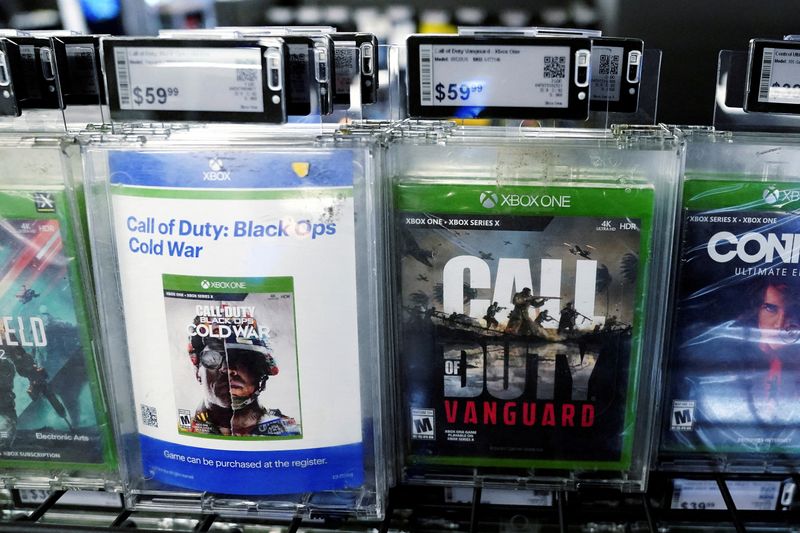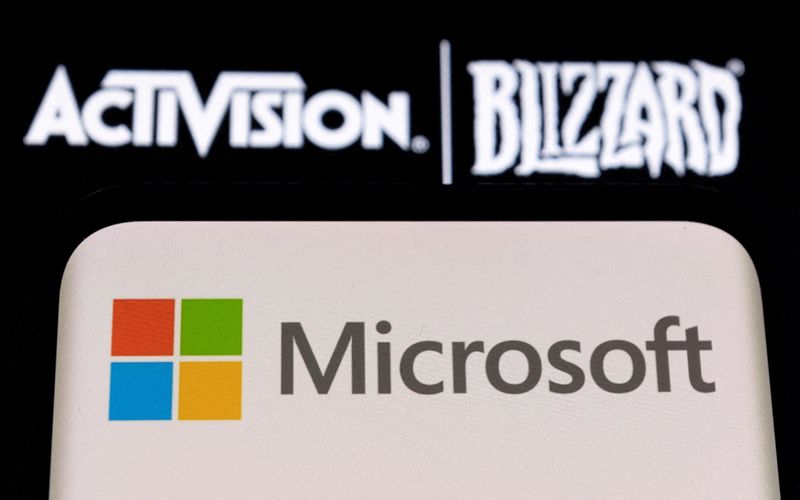By Paul Sandle
LONDON (Reuters) - Britain placed another hurdle in the way of Microsoft (NASDAQ:MSFT)'s $69-billion mega purchase of "Call of Duty" maker Activision Blizzard (NASDAQ:ATVI), saying it could harm gamers by weakening the rivalry between Xbox and Sony (NYSE:SONY)'s PlayStation.
The Competition and Markets Authority (CMA) said on Wednesday the biggest-ever deal in gaming, announced a year ago, could result in higher prices, fewer choices and less innovation for millions of players, as well as stifling competition in cloud gaming.
It said Activision's flagship "Call of Duty" franchise was important in driving competition between consoles, and Microsoft could benefit by making the game exclusive to Xbox, or only available on PlayStation under materially worse conditions.
The deal is being scrutinised in the United States and Europe as well as in Britain, where the CMA showed its willingness to take-on big tech in 2021 when it blocked Facebook-owner Meta's acquisition of Giphy.
In December, the United States moved to block the deal, citing Microsoft's record of hoarding valuable gaming content. The Federal Trade Commission has set a hearing before a judge for August this year.
The EU is also preparing a statement of objections about the deal, sources told Reuters last month.
Alex Haffner, competition partner at law firm Fladgate, said the CMA's comments suggested that structural commitments, such as asset sales, might be the only way to allay its concerns.
"This would obviously call into question the strategic rationale for the deal," Haffner said. "Microsoft faces a stiff challenge to get the global regulatory green light."
Microsoft has pledged to keep "Call of Duty" on PlayStation. The popularity of the first-person shooter franchise is undimmed nearly two decades after launch, with the latest instalment achieving $1 billion sales in its first 10 days in October.
But the U.S. tech giant has said the deal is about more than "Call of Duty".
It has said buying the company that also makes "Overwatch" and "Candy Crush" would charge its growth in mobile, PC, and cloud gaming, as well as consoles, helping it compete with the likes of Tencent as well as Sony.
Sony, however, has led opposition to the deal, saying last year that it was "bad for competition, bad for the gaming industry and bad for gamers themselves."
CROSSFIRE
The CMA investigation's chair Martin Coleman said his job was to make sure that British gamers were not caught in the crossfire of global deals that could damage competition and result in higher prices, fewer choices, or less innovation.
"We have provisionally found that this may be the case here," he said.
Shares in Activision were down 3% in early trading in New York. Microsoft, which announced an AI-driven revamp of its search capabilities on Tuesday, was up 2.4%.
Microsoft said it would address the CMA's concerns.

"Our commitment to grant long-term 100% equal access to ' Call of Duty' to Sony, Nintendo, Steam and others preserves the deal's benefits to gamers and developers and increases competition in the market," its Deputy General Counsel Rima Alaily said.
Activision Blizzard said the findings were provisional and it hoped to help the regulator better understand the industry before it issues a final report by April 26.
